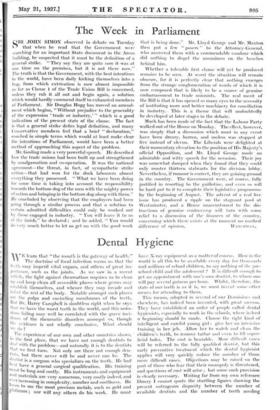The Week in Parliament
SIR JOHN SIMON observed in debate on Tuesday that when he read that the Government were searching for an important State document in the Arcos building, he suspected that it must be the definition of a general strike. "They say they are quite sure it was at one time on the premises, but it is not there now." The truth is that the Government, with the best intentions in the world, have been daily kicking themselves into a bog, from which extrication is now almost impossible as far as Clause 1 of the Trade Union Bill is concerned, unless they rub it all out and begin again, a solution which would hardly commend itself to exhausted members of Parliament. Sir Douglas Hogg has moved an amend- ment which begins, "Without prejudice to the generality of the expression 'trade or industry,' " which is a good indication of the present state of the clause. The fact is that a general strike 'defies legal definition, and many Conservative members feel that a brief "declaration," couched in simple terms which would at least make clear the intentions of Parliament, would have been a better method of approaching this aspect of the problem.
Mr. Gosling made a very powerful speech. He described how the trade unions had been built up and strengthened by amalgamation and co-operation. It was the national agreement—the threat, in fact, of sympathetic strike action—that had won for the dock labourers almost everything they possessed. "-What we have been doing for some time is taking into account the responsibility towards the bottom dog of the men with the mighty power of action and bringing in the bottom dog along with them." He concluded by observing that the employers had been going through a similar process and that a solution to certain admitted difficulties could only be worked out by those engaged in industry. " You will leave it to us at the finish," he declared ; and he added, "YOU would do very much better to let us get on with the good work that is being done." Mr. Lloyd George and Mr. Maxton then put a few " posers " to the Attorney-General, who answered them with a commendable candour which did nothing to dispel the uneasiness on the benches behind him.
Whether a tolerable first clause will yet be produced remains to be seen. At worst the situation will remain obscure, for it is perfectly clear that nothing emerges from the strange conglomeration of words of which it is now composed that is likely to be a source of genuine embarrassment to trade unionists. The real merit of the Bill is that it has opened so many eyes to the necessity of instituting more and better machinery for conciliation in industry. This is a theme that will undoubtedly be developed. at later stages in the debate.
- Much has been made of the fact that the Labour Party -walked out of the House on Monday. The effect, however, was simply that a discussion which must in any event have been dreary, barren, and useless was stopped at five instead of eleven. The Liberals were delighted at their momentary elevation to the position of His Majesty's official Opposition, and Mr. Lloyd George made an admirable and witty speech for the occasion. Their joy -was somewhat damped when they found that they could only muster thirteen stalwarts for the division lobby.
Nevertheless, if rumour is correct, they are gaining ground in the country. The Government were, of course, fully -justified in resorting to the guillotine, and even so will be hard put to it to complete their legislative programme by the beginning of August. The advent of a real live -issue has produced a ripple on the stagnant pool at -Westminster, and a House unaccustomed to the dis- tractions of genuine controversy will turn with some relief to a discussion of the finances of the country, concerning which there exists at the moment no marked










































 Previous page
Previous page